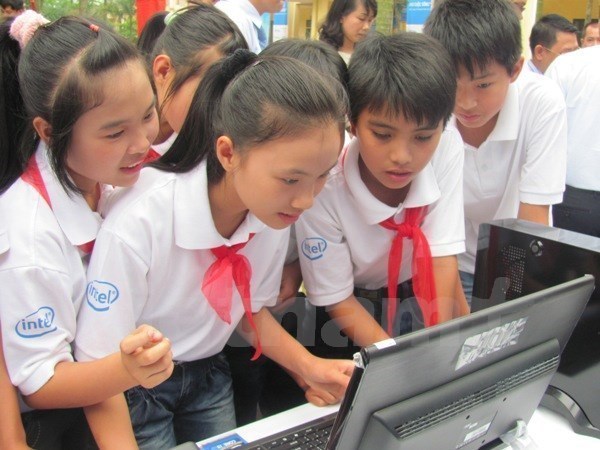UNICEF welcomes Vietnam's approval of programme on child protection online

Illustrative image. (Photo: VNA)
Hanoi (VNA) – The United Nations Children’s Fund
(UNICEF) has welcomed the approval of a programme to protect and support
children to interact in cyber environment in a healthy and creative manner in the
2021-2025 period by Vietnamese Government.
This is the first national-level programme on child protection in the cyber environment.
UNICEF Representative in Vietnam Rana Flowers said that the
Internet brings many opportunities, but also many risks. The new programme approved by Vietnamese Prime Minister Pham Minh Chinh has taken into account
the need to strike a balance between addressing the threats to children and the
promising changes that the digital environment might deliver to them.
It is about connecting children with innovative learning
methods, problem solving, and enhancing the understanding and skills they need
to succeed in the digital world, she said.
According to Rana Flowers, solving the problem of child
abuse on the Internet requires the commitment of the Government and the
self-regulation of online platforms as well as management agencies.
However,
the prevention of abuse in the cyber environment will only be successful when
there is the active and full participation of parents and children themselves
equipped with information about risks as well as preventive measures and report
online abuse.
She said the UNICEF expressed its concern about children's
safety in the cyber environment in five key areas. That is adults unintentionally
provide too much information for child abusers to commit crimes; children spend
too much time playing violent games online; children are persuaded by friends
or bad people to share their sensitive images; children are vulnerable to
online fraud, bullying, and abuse by pedophiles who pretend to be of their same
age.
When abuse occurs on a cyber environment, parents are often
unaware of the risks and do not know what their children are going through
online. For children, they will feel lonely and sad. When bullying happens at
school, everyone can see it, but when it happens online, cruelty and abuse can
have a significant impact on children's mental health and self-esteem, making
them feel isolated and lonely, Flowers said.
Parents should spend time talking with their children, identifying
protection strategies and encouraging children to stand up for each other,
promote kindness and protect each other from abuse, she added.
The UNICEF representative also called on people to act
together to make the internet a safe environment for children to learn,
communicate and express themselves.
According to a recent UNICEF survey, many young people in
Vietnam are victims of cyberbullying but three-quarters of them don’t know
where they can seek support. More and more cases of sex crimes and child
trafficking are being reported. However,
few measures have been taken to protect them from the dangers of abuse by the
digital world or access to health content on the Internet in a safe way.
With the programme to protect children in the cyber environment,
the UNICEF expected the Government of Vietnam to work with the information and
communication technology industry to keep up with the pace of change and
protect children from dangers, harmful effects as well as ensuring that the
internet is always safe for children, she said.
The private sector and civil society should be encouraged to
offer different solutions and opportunities to protect children online, she
added.
Under Decision No 830 signed by Prime Minister Pham Minh Chinh, the national programme on child protection online aims to protect the
privacy of children and prevent and handle acts of abuse. Specifically, the programme focuses on supplying children
with age-appropriate knowledge and skills so that children can self-identify
and be able to protect themselves when online.
The programme includes initiatives in deploying new
technologies such as artificial intelligence and big data to automatically
collect and analyse early warnings on the content not suitable for children.
Websites with the national “.vn” domain and those with IP
addresses in Vietnam will be required to self-categorise content suitable for
children's ages. Those who provide online services and applications for
children have to self-deploy solutions to protect children and assist parents
or caregivers in managing children's use of applications and services.
Network operators and digital platform providers such as
Google, Facebook, and Zalo will apply artificial intelligence technology and
big data analysis to filter videos and clips with malicious content./.













